John C. Reilly is a funny guy…when he’s playing the clown with Will Ferrell. But his filmography is not a laughing matter: he has worked with greats like Paul Thomas Anderson and Martin Scorsese, and at his request, Jacques Audiard directed the western The Sisters Brothers. “53 is pretty old in the age of Instagram and youth-obsessed culture.”
Also read: Film: The Lobster
What can’t John C. Reilly do? He can play the buffoon (Step Brothers), dance (Boogie Nights), play a funny porn star (Boogie Nights), sing (Chicago), argue (Carnage), keep a straight face in front of CGI creations (Kong: Skull Island), and deliver brilliant performances in supporting roles (Magnolia, The Lobster, and many other films). From The Sisters Brothers, a raw and sometimes unexpectedly tender western by the French Golden Palm winner Jacques Audiard (Dheepan, Un prophète), we learn that he can also ride a horse and perform beside the great Joaquin Phoenix.
During the Gold Rush, hitman Eli (Reilly) and his alcoholic brother Charlie (Phoenix) call in the help of a fortune hunter (Jake Gyllenhaal) to hunt down a cunning chemist. At the last Film Fest Gent, John C. Reilly told us why he was so determined to make a film adaptation of Patrick deWitt’s novel The Sisters Brothers. “What struck me about the novel was how emotionally vulnerable these men were. For a western that’s pretty extraordinary and original. With captivating detail, Patrick deWitt describes what things were really like in San Francisco in 1851, during the infamous Gold Rush. It was a very fascinating and crazy time and much more complicated than I realized from watching westerns. People from across the world and with very different cultural backgrounds and languages were all struck by gold fever. DeWitt captured that in a wonderful way.”
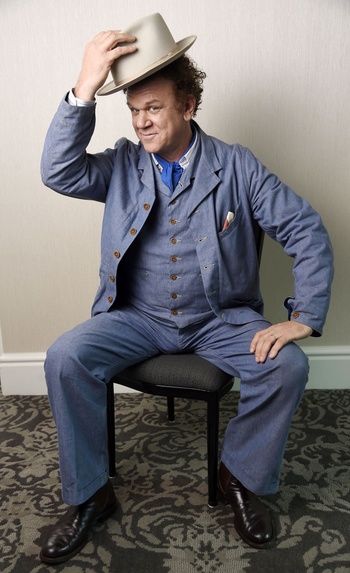
That is a beautiful description, but why did deWitt’s book touch you so deeply?
JOHN C. REILLY: Have you read it? You should. It contains so much more than we could fit into the film. It is a genuine page-turner. I read the whole thing in a single day. That must be some kind of record. I was particularly gripped by Eli. I felt as though the author knew me personally and had written that character especially for me. But that is obviously not true. The world sees the Sisters brothers as filthy boys from a farm. But they are actually very good at their job and they are always one step ahead because you underestimate them. I was also intrigued by the low self-esteem, the concern about weight, and the search for the love that you deserve but cannot find. DeWitt describes very honestly what it is to be human. I thought that was much more interesting than just another variation on the John Wayne myth. Don’t get me wrong, I love Clint Eastwood, John Wayne, Yul Brynner, and all the great cowboys from the westerns. But I wasn’t looking for a western, I was looking for something that had relevance to my life and for a believable character that I could immerse myself in.
Did you take the material to Jacques Audiard not only because he is a great director but because he, as a French outsider, would automatically have a different perspective on the all-American genre of the western?
REILLY: You just answered your own question! [Laughs] I wouldn’t put it any other way. The book is full of Europeans. It makes sense that a European would make this story. I was very surprised when I discovered that Jacques (Audiard) is the very first Frenchman to direct an American western. I think the only previous time was a Frenchman who made a western in France in the 1920s. Jacques brought a natural objectivity to the project. He appreciates many westerns, but he wasn’t trying to make a classic western. He has other passions. He says that he thinks of The Sisters Brothers as a period drama and a main reference point is The Night of the Hunter by Charles Laughton. It’s almost a fairy-tale about a family. That is especially clear when we get lost in the woods and I get bitten by a spider.
In one of the funniest and also most telling scenes, your character finds a toothbrush, but he doesn’t really know how to use this new invention. Like many other westerns, The Sisters Brothers describes the turning point when America was gradually leaving the Wild West behind and developing more rules and sophistication.
REILLY: Exactly! There are other indications that Eli wants to become more enlightened and evolved. His relationship with his horse is a very important part of the story. It’s the first time that his own concerns are not central and that he cares about something other than himself and his brother.
The film questions masculinity. What is a man? What is possible for a man? What is the truth of where we come from? If we’re honest about our past, we have to admit that we come from genocide and the law of the gun. That’s the truth of the world, the truth of history. If you look at the four characters in the film, it’s almost like those sketches of evolution, going from prehistoric to upright man.
There’s another thing people seem to be responding to and I didn’t expect this at all: the idea of sustainability.
Do you mean the idea that we should change the way we live?
REILLY: Absolutely. Should we be different in order to move to the future? It’s not a question anymore. We know that we have to be different. We simply will not survive if we continue living the same way.
In 1851, people in the West realized that as well. Shortly after this story, cartridge bullets were invented: pre-made bullets. In our story, you still had to hand load each cylinder. When cartridge bullets were invented, the number of deaths increased exponentially. That made people in the West stop and think: wait a second, I have a farm, I have a wife and children who go to school. I can no longer tolerate that people just shoot one another. We need laws, a legal system, and a town sheriff.
Today we’re faced with a different urgent problem. Read the newspaper: the icecaps are melting and the oceans are full of plastic. Everybody, irrespective of their political preferences, is thinking about sustainability.
The Sisters Brothers meditates on how we should care for our society. In that respect, the film is very relevant to a contemporary audience.
Can we describe The Sisters Brothers as Step Brothers on a horse?
REILLY: No, you certainly cannot.
Sorry.
REILLY: It’s okay. Joaquin Phoenix loves Step Brothers. I love Step Brothers. But comparing The Sisters Brothers to that comedy is a journalist’s trick.
In Step Brothers, you form a comic duo with Will Ferrell. We will soon be seeing you co-star again in Holmes & Watson. And you are also playing Laurel Hardy in the biopic Stan & Ollie. Are you noticing a trend?
REILLY: Between now and January, four of my films are being released: Wreck-it Ralph, Holmes & Watson, The Sisters Brothers, and Stan & Ollie. I am paired with someone else in all four of them. It’s not a new thing. I have played a lot of partners in movies. It’s a fair question: why so many duos?
So… Why so many duos?
REILLY: I get that question a lot and I have come up with a few theories. I come from Chicago, I come from a large family. I’ve always worked in a communal way with other actors, doing theatre. I never saw myself as a star performer or even a solo performer. I’m no soloist, I work in a collective or at least in a partnership. It’s a more fertile place for me to work. You don’t have to generate every single idea yourself. By engaging with someone else, ideas come to you. If things don’t work out, it’s not your sole responsibility. You share the blame.
Do you adapt easily? Is collaborating with Will Ferrell different from collaborating with Joaquin Phoenix?
REILLY: Of course it is. I think it’s always the job of an actor to adapt. Adapting to directors, other actors, the material, to what the day or the scene needs. Every film is a custom job. I have been exceptionally fortunate to be able to work with Will Ferrell, Martin Scorsese, and Paul Thomas Anderson several times. When I started my second film with Paul Thomas Anderson, I thought it would go very smoothly because I already knew him. But it immediately became clear that that is the wrong attitude. To do good work, you have to stay alert and think hard about what a particular scene needs.
In Stan & Ollie you play the rotund half of the world-famous burlesque duo Laurel & Hardy. The film does not show them at the height of their fame but at the very end of their career during a tour in Great Britain that started very badly.
REILLY: We were looking for something that you haven’t seen. That’s the age we live in: Wikipedia, Google, and YouTube can show and tell you everything on the spot. Just press the button if you want to watch the films of Laurel & Hardy. But if you want to know what their relationship was like, then you have to see our movie.
Joaquin Phoenix is a very demanding actor. That means that as his co-star, you have to be sharp
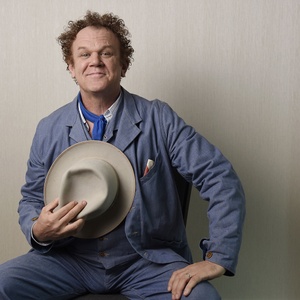
You imitate Oliver Hardy, you sing, dance, ride horses, play the clown, and move us deeply. Is there anything you don’t dare to do on camera?
REILLY: Something that really scares me? I can’t think of anything off the top of my head. For better or for worse, maybe that’s not a good thing. I do think it’s good to be nervous when you have to perform. It keeps you attuned to the needs of the audience. But at this point in my career I don’t get nervous about performing like I used to in my younger days. I only get nervous about understanding what the material is and I still worry about having the time required to gain some insight in what needs to be done.
Are you having a great time? You don’t have to prove yourself anymore. And I presume that you don’t have any enormous financial worries.
REILLY: I’m doing okay. Not as well as some producers are doing though. [Laughs] But I don’t just have my pick of the roles I want to play. If only. Very few actors can be picky about their roles. People don’t go to the cinema to see a star anymore. The most popular films are films that people already understand before they’ve seen them.
If I were to be living in the era of Humphrey Bogart, then this might be the most productive time of my life. For a well-known actor in Bogart’s time, 53 was a good age to be. Unfortunately, 53 is pretty old in 2018, in the era of Instagram and youth-obsessed culture. I want to believe that I’m in the most fertile time of my career, but we’ll have to see about that. There aren’t a lot of Humphrey Bogarts out there right now. I don’t see many men or women of a certain age telling stories about adult issues. That’s why I took the initiative myself this time.
You were the driving force behind The Sisters Brothers. That is something new for you, if I’m not mistaken.
REILLY: I’m not getting any younger. Once you are no longer the flavour of the month or a new surprising thing, you have to find your own opportunities. And I can’t complain because from a certain age, women have it much harder in Hollywood.
Anyway, if I want to work in interesting, new, challenging films, I have to look for them actively. But to be totally honest, I wasn’t that active. I had almost no time and I was moving from one project to the next. My wife, Alison Dickey, was searching actively, and she found Patrick deWitt’s novel. She had met him on the set of the film Terri.
As the producer, was it your job to make sure Joaquin Phoenix was out of bed on time?
REILLY: Being a producer is the most interpretable job in the industry. Some take care of financing but you never see them on the set, others are responsible for scheduling and making sure the director doesn’t overrun. My job as a producer evolved. My wife and I bought the rights to deWitt’s book. We developed the story together and contacted Jaques Audiard.
During the shoot, I had to focus primarily on my work as an actor. Joaquin Phoenix is a very demanding actor – and justifiably, that’s why he’s so good – and that means that as his co-star, you have to be sharp. So during the shoot, my role as a producer was limited to taking care of Joaquin. I embraced that job because it coincided perfectly with what my character does: taking care of his brother. Where is he? What does he need? Is someone bothering him? Is he well rested? Why is he angry? That was our relationship when the camera was on and when it was off. Joaquin and I lived together, cooked for each other, drove to the set together… We were shoulder to shoulder the whole time.
How bromantic!
> The Sisters Brothers. US, dir.: Jacques Audiard, act.: John C. Reilly, Joaquin Phoenix, Jake Gyllenhaal, Riz Ahmed
Read more about: Film
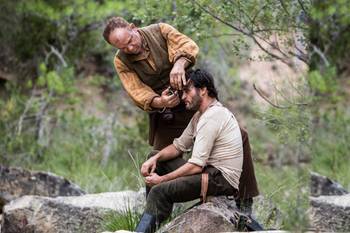
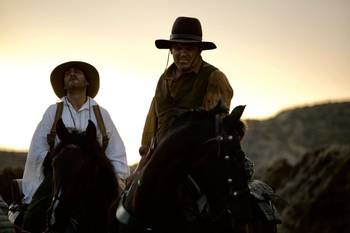
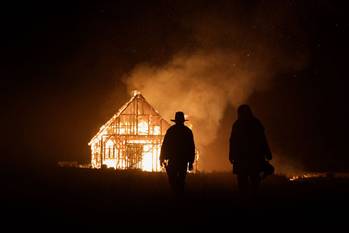
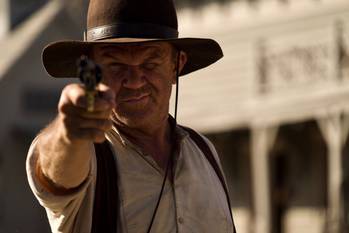
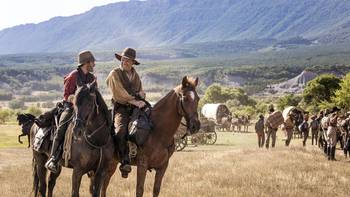
Fijn dat je wil reageren. Wie reageert, gaat akkoord met onze huisregels. Hoe reageren via Disqus? Een woordje uitleg.